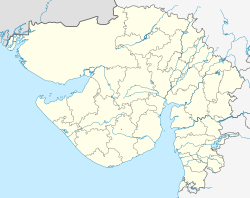|
Talala, Gujarat
Talala (Gir) is a town and a taluka in Gir Somnath district in the Indian state of Gujarat. Talala is famous for Asiatic lions and orchards of Kesar mangoes. Earlier Talala (Gir) was part of Junagadh district. APMC market yardAPMC Talala (Gir) was established on 6 June 1987. It started operation in 1991. Construction cost was around 21,984,984 rupees, which includes shops, road, godown, compound wall, office. The Kesar mango auction in APMC started on 29 April 2000.[1] Vihar ExportsVihar Exports is a company based in Surva village of Talala taluka of Gir Somnath in Gujarat. They started working together with local farmers and started a new venture by sending fresh organic products directly from farmers to customers. They also formed a grocery company called Vihar Exports and many Bollywood actors also like it.[2] Sri Bai ashramSri Bai ashram is located on the bank of Hiran River. It is a historic temple of Sri Bai.  Hadmatiya stupaBuddhist Stupa, belonging to the era of Kshatrapas (built in the 2nd century), locally known as Vajir Panat No Kotho is in the forest three kilometres from Talala Taluka. It is located on the bank of Sarasvati river. The outer part of the stupa was built around the start of the Common Era using burnt bricks. The inner part is filled with undressed stones.[3] References
|
||||||||||||||||||||||||||||||
